What is Apple’s IOS 14 Update?
Apple is currently testing the privacy update in a beta version of iOS 14, which is expected to roll out to all users in early spring. Apple has announced changes with iOS 14 that will impact how companies receive and process conversion events from tools such as the Facebook pixel. Businesses that optimize, target, and report on web conversion events from business tools will be affected. Apple first announced upcoming privacy changes last summer, which provided advertisers and app makers time to prepare. However, this has become a major point of conflict for ad-supported companies since they could lose revenue from the upcoming changes.
Review 42 reported 44% of local businesses say they depend on social media to generate brand awareness, and 41% depend on it to drive revenue.
Specifically, Apple will begin to require that all applications in the App Store show a discouraging prompt to users on iOS 14 devices, in accordance with their AppTrackingTransparency framework. Apple’s policy will prohibit certain data collection and sharing features unless people opt into tracking on iOS 14 devices. As more users opt-out of tracking on iOS 14 devices, ad personalizations and performance reporting will be limited for both app and web conversion events. Now when a user installs or updates the new iOS 14 update, an alert will appear asking the user to opt-in or opt-out of sharing this information. Tinuiti reported about 70% of IOS users currently share their IDFA with app publishers but after this change it’s estimated that this number will drop to 10% to 15%.
Apple commented on the update stating, “Privacy is a fundamental human right and at the core of everything we do. That’s why with iOS 14, we’re giving you more control over the data you share and more transparency into how it’s used.”
In response to these changes, Facebook will also start processing pixel conversion events from iOS devices using Aggregated Event Measurement. The provided action list will support business efforts to preserve user privacy and run effective campaigns.
Response Actions for iOS 14 Privacy Changes:
- Domain Name Verification: This will grant the ability to optimize a maximum of 8 conversion events per domain for optimization and reporting. Domain name verification needs to be completed for the effective top level domain, plus one.
- Manage Preferences: For preferred conversion events, prioritize up to 8 conversions that drive maximum impact.
- Compare Attribution Models: To fully understand the impact, compare the new 70 attribution model to the old. This will help companies better anticipate any changes in the reported conversions that are a result from moving to a 7-day window.
- Conversion API: Measure conversions using website servers rather than only relying on browser-based cookies.
Changes May Limit Abilities For:
Remarketing Campaigns: As more users opt-out of tracking, campaign audiences will become smaller.
Audience Delivery: Audiences that were previously created may be affected as ads need data to deliver the most relevant audiences at the correct frequency.
ROAS Optimization: Eventually predicting and optimizing costs per action will change, depending on the data available.
Ad Personalization: Personalization might be limited based on the information collected about each customer.
Reporting: Measurement and reports created for conversions from specific customers will be affected.





